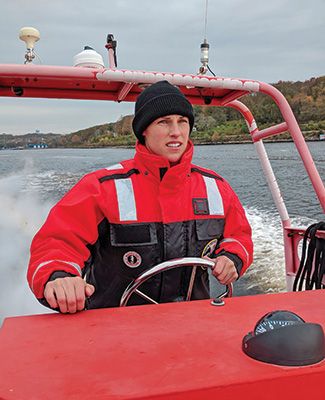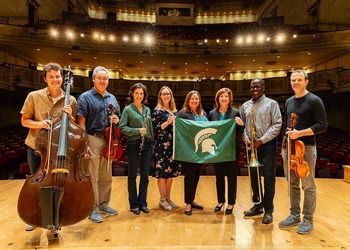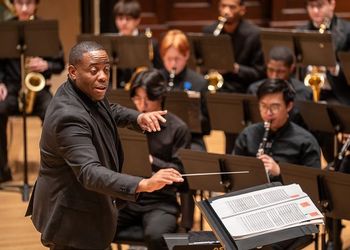On the Open Seas

On the Open Seas
Hayley Betker finds a home for her environmentalist sensibilities conducting research with the National Oceanic and Atmospheric Administration
October 1, 2019Jarvis Island sits in the middle of the vast Pacific Ocean, separated from any populated land by hundreds of miles of glittering waters. Viewed by only a sliver of humanity across centuries, the tiny island remains accessible only to carefully vetted researchers and government personnel.
Count Hayley Betker among the lucky few. In the summer of 2018, Betker, then a new National Oceanic and Atmospheric Administration Corps officer stationed in Honolulu, ventured to Jarvis Island with a team of scientists and NOAA personnel. There, she observed dolphins and other wonders of maritime nature, but also the far-reaching effects of climate change as the island’s coral reefs battled shifting environmental conditions.
The visit inspired a mix of awe and earnest reflection.
“In one trip, I saw the beauty of nature and the urgent need to protect it,” Betker said.
A determined guardian of the environment and advocate for its health and sustainability, Betker traces her curiosity about the natural world to her childhood years in Petoskey, Michigan, as she watched Lake Michigan’s waters recede.
“I couldn’t understand why and wanted to know more,” she said.
After earning an environmental engineering degree from MSU in December 2014—among the first women to do so—Betker began her career at Ford Motor Co., performing environmental testing and data analysis on vehicles as an applications engineer. While her efforts served a worthwhile purpose, Betker hungered for more varied, creative work and deeper ties to the environment.
It’s hands-on, technical and fast-paced work that’s considerate of people and the environment, which is exactly what I love about it.
That’s when Susan Masten, Betker’s college adviser and a professor of civil and environmental engineering, urged her to consider NOAA.
Though Betker had never heard of the agency, her initial research intrigued her enough to apply. She was accepted, and completed basic officer training at the U.S. Coast Guard Academy in December 2017. The 20-week program prepared Betker to captain large vessels and certified her in areas such as advanced firefighting, sea survival and fast rescue boating.
First assigned to the NOAA ship Hi‘ialakai in Honolulu, one of 16 in the NOAA fleet, Betker’s search for meaningful work materialized amid a range of oceanographic research, including studies of coral reefs and fish stocks as well as maritime heritage surveys.
“I fell in love with the work and felt I was contributing to something valuable,” she said.
This past April, Betker moved cross-country and began an eight-month assignment on the NOAA ship Henry B. Bigelow, homeported in Newport, Rhode Island. As NOAA’s Northeast Fisheries vessel, the 209-foot ship’s crew—Betker, four other officers, and two dozen sailors—studies marine life and ocean conditions along the nation’s Atlantic Coast. It also sets guidelines for East Coast fisheries, whether that’s commercial entities chasing lobster in Maine, crab in Maryland or mackerel in Florida.
“It’s hands-on, technical and fast-paced work that’s considerate of people and the environment, which is exactly what I love about it,” Betker said.
And if it leads to one-of-a-kind experiences like peering into the waters off Jarvis Island, well, that’s all the better.
Contributing Writer(s): Daniel P. Smith




